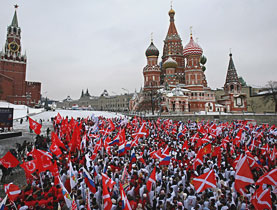
Russian elections “a defeat for democracy”

European monitors – including Swiss parliamentarian Andreas Gross – have declared Russia's parliamentary elections "unfair".
President Vladimir Putin’s party collected nearly two-thirds of the votes for the new legislature, a victory that should enable him to remain the country’s de facto leader should he leave office as planned next year.
After 98 per cent of the votes were counted, Putin’s United Russia was guaranteed 300 of the State Duma’s 450 seats, giving the party the two-thirds majority needed to modify the constitution.
The president described the weekend’s result as a vote of public confidence in him, saying it would allow his party to strengthen its position in parliament.
Gross, a member of the centre-left Social Democratic Party and a seasoned observer of elections, said that technically speaking the ballot was successful, but that its legitimacy remained doubtful.
“You need to be able to observe that the 80 per cent of the electoral process that takes place before the election was fair and pluralistic,” he told swissinfo. “This wasn’t possible since the observers weren’t allowed to operate during the campaign.”
For Gross, who travelled to Ekaterinburg in Siberia to monitor the vote for the Council of Europe, the result is therefore not surprising. “It is a major defeat for democracy,” he added.
The observation mission involved delegations from the Council of Europe and the Organization for Security and Co-operation in Europe.
Foreign ministry
The Swiss foreign ministry has echoed the concerns of the OSCE and the Council of Europe.
“Although the polls were well organised in part they did not meet the requirements of fair elections as international observers pointed out,” foreign ministry spokesman Lars Knuchel told swissinfo.
Some smaller political groups were excluded, the ruling party abused its administrative resources, the opposition were treated like children and the media showed bias, Knuchel quoted observers as saying.
“Limited competition”
The monitors said the elections took place in “an atmosphere which seriously limited political competition and with frequent abuse of administrative resources, media coverage strongly in favour of the ruling party, and an election code whose cumulative effect hindered political pluralism”.
Only three other parties, including the Communists, are expected to clear the seven per cent limit needed to enter the parliament.
But Gross says this will do little to deter Putin from running Russia the way he wants to.
“Three of the four main parties taking part are products of the Kremlin,” he said. “They were created by the president’s spin doctors and will control 85 per cent of parliament.”
Gross says Putin feels insecure, wanting to ensure a crushing majority in the Duma.
“[Putin] is afraid of having to face a revolution like those in Ukraine and Georgia, however unlikely this might be,” he said.
The Russian president now seems to have ensured that the country is his to control and could possibly present himself for an unprecedented third term as head of state.
“With his majority, the constitution can be modified at will, giving him a chance to run for president again,” Gross added. “Anything is possible and that could lead to a very dangerous situation.”
swissinfo
Russia’s Central Election Commission said that with almost all votes counted, United Russia had won 64.1 per cent of votes, nearly six times as many as the nearest challenger, the Communist party.
Two smaller pro-Kremlin groupings took another 16 per cent of the vote. Pro-Western parties won no seats.
The observers from the Council of Europe and the Organization for Security and Co-operation in Europe said that:
The merging of the state and a political party (United Russia) is an abuse of power and a clear violation of international commitments and standards.
The media showed strong bias in favour of Putin and United Russia.
The new election code also made it extremely difficult for new and smaller parties to develop and compete effectively.
There were widespread reports of harassment of opposition parties, detentions, confiscation of election material, threats against voters and allegations of the potential misuse of absentee certificates.

In compliance with the JTI standards
More: SWI swissinfo.ch certified by the Journalism Trust Initiative



























You can find an overview of ongoing debates with our journalists here . Please join us!
If you want to start a conversation about a topic raised in this article or want to report factual errors, email us at english@swissinfo.ch.